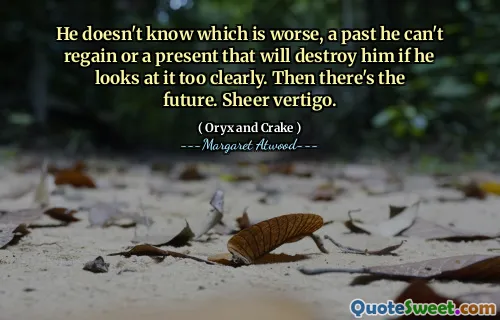What pays for all this?""Grief in the face of inevitable death. The wish to stop time. The human condition.
In Margaret Atwood's "Oryx and Crake," the narrative delves into profound themes surrounding human existence, notably the inevitability of death and the pervasive sense of grief that accompanies it. The text suggests that individuals grapple with the desire to halt the passage of time, reflecting a deep-seated struggle against mortality. This yearning illustrates a central aspect of the human experience, as people face the transient nature of life and their inevitable fate. This contemplation of death is tied to the broader human condition, emphasizing how it shapes our actions, emotions, and choices. Atwood's exploration underscores the complexity of life, revealing how grief and the desire for permanence resonate within all individuals, ultimately influencing societal values and personal motivations.
In Margaret Atwood's "Oryx and Crake," the narrative delves into profound themes surrounding human existence, notably the inevitability of death and the pervasive sense of grief that accompanies it. The text suggests that individuals grapple with the desire to halt the passage of time, reflecting a deep-seated struggle against mortality. This yearning illustrates a central aspect of the human experience, as people face the transient nature of life and their inevitable fate.
This contemplation of death is tied to the broader human condition, emphasizing how it shapes our actions, emotions, and choices. Atwood's exploration underscores the complexity of life, revealing how grief and the desire for permanence resonate within all individuals, ultimately influencing societal values and personal motivations.






